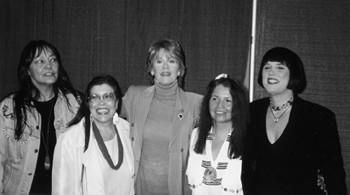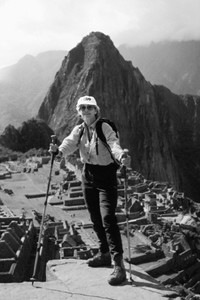My Life So Far (93 page)

With Eve Ensler, having just performed the final monologue in
The Vagina Monologues
at Madison Square Garden. I had been so scared beforehand that I prayed I’d be sideswiped by a taxi—not killed, just hospitalized—so that I wouldn’t have to go through with my first acting in fifteen years. It went well—the whole event was memorable— and gave me courage.
(Mark Abrahams/German Vogue)

Left to right: Actress Tantoo Cardinal, Karen Artichoker, me, Suzanne Blue Star Boy, and Eve Ensler at a V-Day event in Rapid City, South Dakota, to raise funds for a women’s shelter on the Pine Ridge Reservation. I’ve come full circle.
It’s not that I was entirely conscious of what was happening to me. It was like a slow letting go at the very center of myself. My relationships with people began to shift. I wasn’t reactive anymore (amazing, if reactive is what you’ve been most of your life). I was detached, yet my heart had opened. The space between me and other people seemed filled with a new, vibrating energy that grew exponentially more intense when I felt connected to other women. In the “old days,” I would go to a party and wonder,
Will they like me? Will I be pretty enough? Interesting enough?
Now I was coming into a party thinking, Do I really want to be here? Is there anyone I want to connect with?
After a month or two Vanessa made it clear that I needed to start thinking about moving out. I no longer had a home of my own, having sold it in order to make my home (homes) with Ted. When it dawned on me that we were splitting up, I had to think about where I was going to live. It took me about three seconds to realize I wanted to stay in Atlanta. This decision had been so sudden and certain, it took me by surprise. (It certainly took many of my New York and California friends by surprise.) There comes a time in life when you have to put down roots. Why not Atlanta? I was sixty-two; Vanessa, Malcolm, and Lulu were all living there now; I had made many good friends in Georgia; I was committed to the important work my organization, the Georgia Campaign for Adolescent Pregnancy Prevention, was doing with our school-based programs for girls and boys and with young mothers and fathers, and I longed to be more hands-on. Enough moving around! Besides, I like the Chekhovian nature of the South: a slowness, a love of talk for its own sake, the friendliness and humor; the jokes, like heirlooms, passed back and forth and savored as though for the first time; an acceptance of people’s idiosyncrasies. And where else can you hear expressions like “frog strangler” (for a heavy rain) and “lower than a pregnant duck” (when you’re depressed)?

As a fund-raiser for G-CAPP, I lived a lifelong dream and, with ten fit friends, made the five-day trek to the ancient Inca city of Machu Picchu. I was single now and could do these things.
But there is something else that contributes to my love of the South. Most of my life I had lived in sophisticated, relatively privileged coastal cities like Los Angeles and New York. I had grown weary of criticism about people in those places being elitists, out of touch with the American mainstream. Just as it had taken my going to France to begin to understand America, so it had taken my move to Georgia to show me that the criticisms were at least partly true. With this had come a realization that appealed to the activist in me: If you can effect change in the South, you can effect change anywhere. There’s a sense of reality—things aren’t as prettified and above the fray as in Hollywood. History is closer to the surface, possibly because our Civil War bloodied the soils and souls of this southern land in ways that can never be entirely wiped away or understood by northerners or West Coast folk.
So out I set on a new life as a solo, short-haired southerner, not entirely certain where my less traveled road would lead me, but sure that my choice was right.
CHAPTER THREE
LEAVING MY FATHER’S HOUSE
Oh this is the animal that never was.
They hadn’t seen one; but just the same, they loved
its graceful movements, and the way it stood
looking at them calmly, with clear eyes.
It had not
been.
But for them, it appeared
in all its purity. They left space enough.
And in the space hollowed out by their love
it stood up all at once and didn’t need
existence. They nourished it, not with grain,
but with the mere possibility of being.
And finally this gave it so much power
that from its forehead a horn grew. One horn.
It drew near to a virgin, white, gleaming—
and was, inside the mirror and in her.
—R
AINER
M
ARIA
R
ILKE,
from
The Sonnets to Orpheus,
II, 4
A
LL MY LIFE
I had been a father’s daughter, trapped in a Greek drama, like Athena, who sprang fully formed from the head of her father, Zeus—disciplined, driven. Starting in childhood, I learned that love was earned through perfection. In adolescence, my feelings of imperfection centered on my physical being, and I abandoned my poor, loyal body and took up residence in my head. Whether you are male or female, that split between body/heart and mind is the fatal one when it comes to being a fully realized person. Your soul becomes homeless. In the house of the Fathers, there is no room for soul.
I am referring here to “father” not in the biological sense but metaphorically, to the house of the Fathers, the patriarchs—to a way of existing by seeing myself through the eyes of men and accommodating them on the deepest, invisible level (while seeming to do the contrary) and, in so doing, delivering a part of myself to a world that bifurcates head and heart, renders empathy (for oneself or for others) impossible, and makes both men and women, boys and girls, less human than they inherently are.
Don’t get me wrong—I love men. One reason I didn’t become a feminist sooner is that I erroneously thought it required male bashing. In fact, the more I have come to understand the nature of the Fathers’ house, the
more
I love men, because I see how patriarchy’s toxic cloistering has dehumanized them as well.
For me, the journey from the house of the Fathers has been a long time coming. I didn’t know, when I started writing this book almost five years ago, that I would arrive at this place, nor did I know exactly what “place” I hoped to get to.
There have been (and will continue to be) many course corrections on this path to enable my whole embodied spirit, the unicorn in Rilke’s poem, to manifest itself. For me, as Rilke describes, the journey had to start with “the space hollowed out by . . . love”—self-love—despite the absence of perfection. That love allowed me to accept myself and imagine going beyond where I’d been as a disembodied, male-identified woman, to arrive at a belief so strong in “the mere possibility of being” that the unicorn—my embodied spirit—“stood up all at once and didn’t need existence.” Because the transformative experiences we go through over our lives are so elusive, their essence can sometimes best be captured through metaphor.
T
wo very nonpoetic impediments at the start of this third part of my journey were my breasts. It’s hard to squeeze through the door of the Fathers’ house with breast implants. Soon after my separation from Ted, I began to feel an urgent need to have those implants removed, because I now saw these false appendages as sad, misguided reminders of a woman who didn’t own her womanhood.
A series of male doctors assured me that the procedure could not be reversed successfully, but finally a friend of mine, a woman my age who had had it done, referred me to her female surgeon. This doctor told me that it is not uncommon for women of a certain age—when they have developed an authentic self and no longer need to define themselves by what shows on the outside—to want the implants removed.
When he first saw me postremoval, Troy said, “Mom! You’re back in proportion again!” Yes, in more ways than one.
Psychologist Marion Woodman says the body is our “chalice for Spirit” and if there is no Spirit, we may try to fill its emptiness with addictions. In my forties I had stopped bingeing and purging, but I wasn’t really healed; I was the way a dry drunk is in relationship to alcohol. Now I feel I have found spiritual food to fill what was always spiritual hunger, so I am no longer a dry drunk in relation to my eating disorder. Along the way I have also stopped drinking alcohol. Since this is my last act, I sure as hell want to try to do it on the natch—replacing spirits with Spirit.
P
erhaps you are wondering how I can talk about leaving the patriarchal, hierarchal structures of the Fathers’ house only to turn around and slip into the patriarchal, hierarchal structure of Christianity. This is exactly the conundrum I have been facing.
Always one to give my all to whatever I undertake, when I began this part of my journey—the soul’s journey—I committed myself to what was presented to me. But as I diligently slogged through my weekly Bible classes, I felt the reverence slipping away, and I began to get scared. How to get back what had begun as an intense personal experience? I met some inspiring, extraordinary Christians who clearly lived their faith. Yet others came at me, fingers pointing: “How could you have spoken at that pro-choice rally?” They demanded to know my position on this or that issue. When I commented to one Christian columnist about the difficulty I was having with the belief that all non-Christians would go to hell, he replied, “Uh-oh, you sound like a Universalist!” Hey, that sounded about right. Given all the bloodshed and persecution that has gone on through the ages in the name of religion, shouldn’t we start practicing tolerance? Claiming that Jesus was the
only
way to salvation felt like Christian imperialism.
Maybe this isn’t the spiritual home I seek.